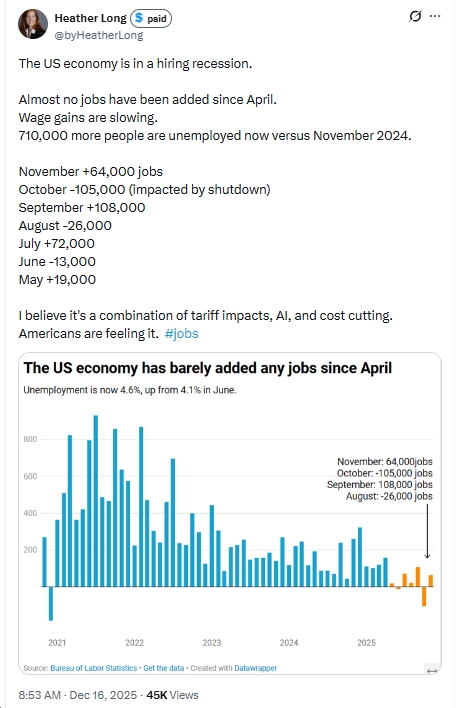It turns out that not every millionaire or small business owner is in lock step with the Chamber of Commerce and Republicans when it comes to extension of the Bush tax cuts for the wealthiest among us. According to Isaiah J. Poole in Campaign for America’s Future two “significant mass defections” have turned up that support extension of the tax cuts for middle class Americans but do not support extension of those cuts for those earning more than $250,000, and these independent groups are comprised of the very classes which supposedly would benefit most from the position of the C of C and the Republicans
On Thursday the group Patriotic Millionaires for Fiscal Strength began an online petition “calling on Congress and the White House to end the Bush tax breaks for people earning more than $1 million; the first 41 signers are “citizens who now or in the recent past earned an income of $1,000,000 per year or more.” Their statement goes on: “Now, during our nation’s moment of need, we are eager to do our fair share. We don’t need more tax cuts, and we understand that cutting our taxes will increase the deficit and the debt burden carried by other taxpayers. This country needs to meet its financial obligations in a just and responsible way.”
What a concept! These patriotic Americans are stepping up to the plate. Frankly, they are doing what it seems Obama is reluctant to do: call Americans to a higher duty, cast this whole economic-deficit-national debt problem as the challenge of our generation, and actually lead us in a patriotic struggle (and thereby make the Republicans and the Chamber look like the selfish, irresponsible little traitors they are). The Patriotic Millionaires web site lets us know that there are only 375,000 Americans have incomes over $1 million annually, and that from 1978 to 2007 the incomes of the wealthiest 1 percent of Americans went by 281 percent (and, as we know, the incomes of average Americans stagnated or actually fell). They also point out that during the Great Depression, the marginal tax rate for millionaires was 68 percent, in 1963 it was a whopping 91 percent, and today it is only 35 percent. Simply letting the tax cut for the top 2 percent of Americans would pay down the national debt by $700 billion over the next ten years.
The millionaires who signed the petition come from all across the country, Massachusetts to Oregon, New York to Texas to Utah to California.They even remind us of the fact that at least 44 percent of the members of Congress (both House and Senate) are themselves millionaires—- do you suppose that has something to do with the desire of our elected servants to extend the tax cuts for the wealthy?
As if patriotic millionaires was not astonishing enough, on Wednesday a group of mostly small business owners showed up online, Business for Shared Prosperity, and they go even further than the millionaires. They want Congress to allow the Bush tax cuts to expire on families earning more than $250,000 because, they say, it is simply not true that small businesses need the incentive of the tax break to hire new workers. There goes a major Republican talking point, when one such small businessman said
“Give me more customers and I’ll be forced to buy equipment and hire people to meet demand. Give me a tax break without more customers and I’ll just go to Aruba.”
With that in mind, the Business for Shared Prosperity group plainly feels no community of interest with big business, saying bluntly that “Congress should not let Wall Street and big business CEOs hide behind small business” by demanding a $700 billion tax giveaway “that would be even more harmful for Main Street… Congress should build on constructive action like the Small Business Jobs Act and the overdue infrastructure investment we need.” They provide a very clear rationale for this request, points you will not hear from the tony high-level discussion of the issue in the mass media, such as:
1) Demand spurs hiring, not taxes; what a small business owner pays employees, like other business expenses, is not included in an owner’s taxable income, so hiring new workers only happens if there is demand for their products, i.e., buying customers.
2) Nine years of tax cuts did not work. The 2001-2007 economic expansion was “the weakest since World War II when it came to growth in GDP, consumption, non-residential investment, wages, salary, net worth, and employment”—- despite the presence of tax cuts.
3) The “small businesses” that would keep their tax break from Republicans in the name of job creation would include “partners in large corporate law firms, hedge fund managers, K Street lobbyists, high-powered consultants, Wall Street bond traders, and the country’s wealthiest millionaires”… people would not be hiring anyone, no matter how low their taxes.
4) In fact, the wealthy already pay a lower tax rate than many working-class people. Someone making less than $82,000 pays a tax rate of 25 percent on earned income above $34,000, whereas (according to the IRS), the “400 richest taxpayers increased their average income by 399 percent, adjusted for inflation, between 1992 and 2007, and lowered their effective income tax rate by 37 percent, from 26.4 percent to just 16.6 percent.” That’s even better, I might add, than the libertarian ideal of a flat tax rate, same for everybody (a regressive taxation idea if I ever heard one).
As Mr. Poole points out, if Congress was serious about job creation, they would be debating “how best to use government to stimulate demand and how best to prioritize the billions of dollars to work that needs to be done” on infrastructure, green economy… and education.” If the creators of jobs, small businesses, won’t undertake new hires until they have more paying customers, it stands to reason that customers have to have money to buy, and they won’t have the money to buy if they have no income, which is why “the Congressional Budget Office estimates that unemployment benefits help the economy grow by up to 19 times more than extending tax cuts for the rich, because low-income families spend additional income quickly to meet basic needs.”
So, why did the House on Thursday become so “righteous about insisting on the unprecedented condition that $12 billion needed to pay for emergency unemployment benefits through the end of February” be paid for by cuts in other government programs, in a classic give with one hand and take away with the other? The right-wing must want to enable those vacations in Aruba. Or, maybe it has something to do with making America fail in order to make Obama fail, thinking that doing so will ensure a Republican victory in 2012, and beyond.
It strikes me that these two patriotic groups should be publicized and praised by Obama repeatedly. They should be reported and promoted in the mass media, so they become the new standard of conduct. After all, we are all in this together… aren’t we?



![Thursday News: “Europe draws red line on Greenland after a year of trying to pacify Trump”; “ICE Agent Kills Woman, DHS Tells Obvious, Insane Lies About It”; “Trump’s DOJ sued Virginia. Our attorney general surrendered”; “Political domino effect hits Alexandria as Sen. Ebbin [to resign] to join Spanberger administration”](https://bluevirginia.us/wp-content/uploads/2026/01/montage010826.jpg)
![Wednesday News: “The Grand Opening of an American Concentration Camp”; Trump Threatens to Arrest Mamdani; “Poorest Americans Would Be Hurt By Trump’s Big Bill”; [VA] GOP nominees share stage, but not unity”; “Hoos your daddy, Virginia?” (Not Youngkin)](https://bluevirginia.us/wp-content/uploads/2025/07/montage0702.jpg)













